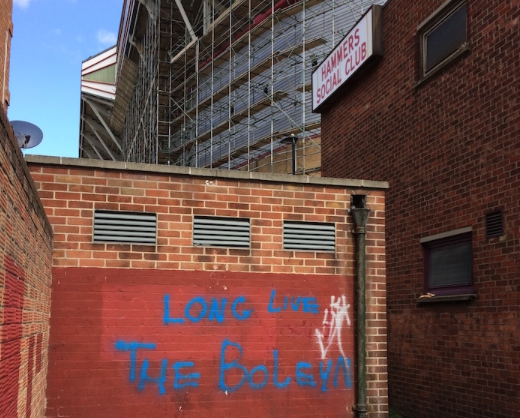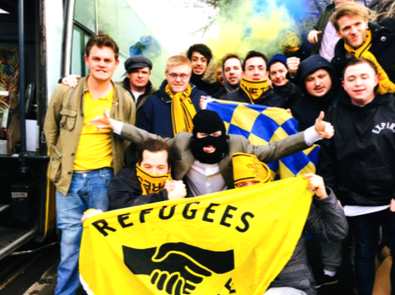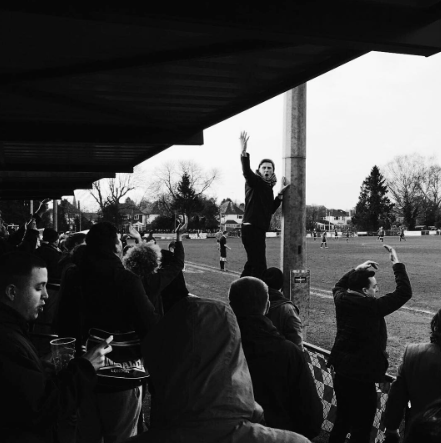Founded in 1881 as Devonshire Park FC, Eastbourne Town FC claim to be the oldest senior football club in Sussex. Less grandiose and informally they also claim host to Pier Pressure and the Beachy Head Ultras - an unusual group of fans united by a sport in which it felt the tides were turning.
Although I am not local to Eastbourne, I am local to the next town over - Hastings. Through the use of Social Media over the years, I have found people of interest that reside in the local areas whom I may not have met otherwise. One such person was Alex Brown, an Eastbourne native who shares similiar passions to mine, one being Graphic Design and the other being West Ham United.

As West Ham’s time at the beloved Boleyn Ground began to come to an end, it appeared Alex had no intention of following the club in it’s unpopular and insensitive move to the Olympic Stadium. Feeling a huge sense of deflation and disillusionment I could relate to, it seemed he switched his attentions to his local club instead.
The birth of an 'Ultra' style fan group around this non-league team is not my story to tell, but how it came to challenge everything I thought I knew about football felt more like a revolution than anything I've ever felt before.
The time came eventually to see this for myself. In March 2016, just days after attending my penultimate game at the Boleyn, a dull Sunday kick-off against Sunderland, I travelled to Horsham to attend the match where Eastbourne Town were playing away from home. Town had travelled via coach whilst I came from Southampton, my train getting me in on time to head minutes down the road and catch the 'Pressure' as they arrived just shy of the ground.

No pubs, no hubbub of rushing crowds, no thick East London accents flogging scarves and programmes and no police presence. Not even an off-liscence, just a neglected bus-stop and some green wheelie bins. This was just a neighbourhood, a stark reminder of the harrowing differences between a game in the top flight and a game as low as it can get without seeming absurd. What was I in for?
Greeted by about twenty people I had never seen before, dressed in yellow scarves and holding a variety of flags, some political - it felt electric from the start. Overwhelmed with joyous irony, social anxiety and the slight shame of feeling tipsy off the few cans I drank on the train over I knew I was in for a day I wouldn't forget. This was organised, almost like a public demonstration, and how odd a look was this tribe juxtaposed to a barren Sussex town roadside. How could a team at this level conjured up such a following?
Conversing with some new faces I swiftly learned that Horsham YMCA FC had issued a statement that Pier Pressure were banned from bringing any musical instruments to the game (the group were no strangers to drums) along with any items such as flares and smoke bombs (those were set off outside of the ground). The use of any pyrotechnic in public is usually considered an offence but it is very common for football fans to light flares and smokes, especially in Europe and South America where the 'Ultra' breed of fan reign supreme.
Pier Pressure wanted it to be known that they did not intend to disrespect any rules and regulations but instead wanted to poke fun at the fact that a lot of the core Horsham fans were somewhat older than they are, therefore less exciting. In the friendliest manner possible and with no desire to inspire any unwanted violence or disruptiveness, the fans simply created a few chants to poke fun at their opposition. The name of the ground 'Gorings Mead' was now of course the Boring Mead.
One thing I noticed very swiftly was the use of language; not one single time in any of the chants did I hear any offensive language or any insult that would usually be heard every five seconds at higher level games. There was a level of discipline and an air of class to this group, but above everything was a niche humour that not only roasted their hosts but also picked at themselves. The Pier Pressure ethos rejects the idea of football as a hostile place and this was a fine example of that; simply a group of fans not just there for the football but there for each other.
And the noise was something else. Even without any instruments, fans made use of the metal and steel around them, banging and beating on railings and walls and even stomping their feet. As the Pier Pressure fans raged their vocal fight, the players on the pitch visibly encouraged by this; the Town players took an unexpected lead late in the game and secured their victory sending the Pressure fans feral. The spirit of the game was alive.

No scoreboards, no on-screen replays, sparse announcements and dogs being walked around the pitch did not paint the common picture of what football was to me, but it felt like this is what it was supposed to be, and all it once was before it became the industrial machine we know it as today. And being able to drink a pint whilst watching the game from the stands, well, that was probably enough to win me over on it's own.
At a time where I felt betrayed by a sport I have only ever loved yet only seemed to punish me as a working classer, Pier Pressure came along and showed me not all was lost. This was football in it's rawest form and fan culture in it's purest. This is what I had always wanted but what the Premier League had always failed in being.
No more hundreds spent on tickets and trains. No more sitting down quietly, the atmosphere dying with each second of play, no more pretending not to hear the homophobic or sexist comments from the man a few rows behind, no more paying four pounds for a pint and not even being able to sit and watch the game with it. No more being looked at as a customer rather than a fan.
West Ham United were now a part of a world that did not reflect or benefit my interests as a football fan. The move to the athletics stadium killed the last piece of it's identity before becoming another London tourist attraction. Eastbourne Town offers the alternative; a club which gives it's fans a voice and a purpose - whose players are on the same level as the spectators and will join them for a drink afterwards. A vessel and platform to show the world the other side of football, and one that would grow and grow as long as genuine fans were pushed away by the clubs they fell in love with as children.